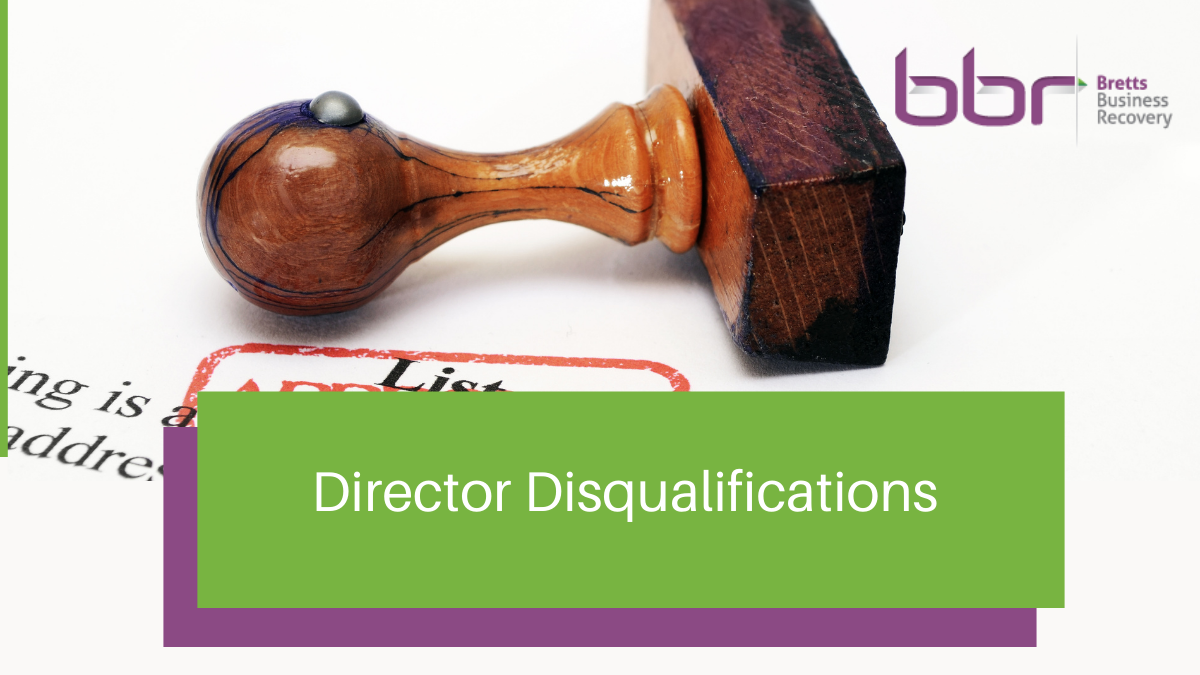Director Disqualifications – the why, how and what next…

If you are a company director and you fail to undertake your duties ( if you need a reminder of what directors’ duties are see our guide here Directors’ Duties) you could be deemed “unfit”. Some of the most common failings in duties to get to this “unfit” stage include:
- not keeping proper company accounts;
- not sending accounts, returns and up to date information to Companies House;
- not paying tax owed by the company;
- using company money or assets for personal benefit, or
- allowing a company to continue trading when it can’t pay its debts;
At present if your company enters an insolvent liquidation or administration process you can be investigated as a director, leading to possible disqualification. Legislation has also been proposed which gives the Insolvency Service powers to also investigate directors who have dissolved their business without following due process – see our article here for further details: New investigation powers. It’s envisaged that these proposals will become a reality later this year.
Disqualification process
If the Insolvency Service considers that you have not fulfilled your responsibilities as director, you will receive information in writing which details what it believes you have done for you to be considered unfit, that it intends to start the disqualification process; and how you can respond.
You can either:
- wait for the Insolvency Service to take you to court to disqualify you – If you disagree with the Insolvency Service you can defend the case in court
- give the Insolvency Service a ‘disqualification undertaking’ – this means you voluntarily disqualify yourself, ending court action against you.
It is not just the Insolvency Service that can bring a case against you – other bodies can apply to have you disqualified, including:
- Companies House;
- the Competition and Markets Authority (CMA);
- the courts;
- a company insolvency practitioner
What happens if I am disqualified?
If a director is disqualified the details will be published online as a matter of public record on the Companies House database of disqualified directors as well as the Insolvency Service’s register of disqualified directors.
Directors can be disqualified for up to 15 years depending on the severity of the breaches of their duties and responsibilities. Disqualification means that you cannot be a director of any company registered in the UK, or any overseas company that has connections with the UK or be involved in the forming, marketing, or running a company. There may also be other restrictions including not being allowed to:
- sit on the board of a charity, school or police authority;
- be a pension trustee;
- be a registered social landlord;
- sit on a health board or social care body; and/or
- be a solicitor, barrister, or accountant.
Other claims
Irrespective of whether or not you are disqualified from acting as a director, it is important to note that a liquidator or administrator may still pursue you for certain claims with a view to recovering monies for the benefit of the insolvent company’s creditors, if appropriate. Some of these claims can include:
Misfeasance
Misfeasance involves misapplying, retaining or becoming accountable for any money or other property of the company. Directors would then have to repay, restore or account for the money or property or any part of it, with interest at such rate as the court thinks fit or contribute such sum as the court thinks just to the company’s assets by way of compensation
Void transactions
Where a company is subject to a winding-up petition that has been presented to court but not yet
determined, any disposal (sale) of that company’s property – and any transfer of shares or alteration in the status of the company’s members – is void unless the court orders otherwise.
Antecedent transactions
Simply put, antecedent means ‘before the event’, so in this case, before the insolvency commenced. They may be reversible by a liquidator or administrator if the company was insolvent at the time they were made, or caused the company to become insolvent at a later date. The office holder looks back at the company’s affairs for up to two years prior to the date of insolvency, with a view to identifying antecedent transactions and reversing them.
Wrongful trading
As set out in section 214 of the Insolvency Act, 1986, wrongful trading occurs when companies continue to carry on trading when they are insolvent – defined as being unable to pay their debts when they fall due. The Insolvency Act made it an offence for a company director to continue to trade if they are aware that their business is unavoidably heading towards liquidation. Wrongful trading laws were suspended during the Coronavirus pandemic to help company directors affected by Covid-19 to keep their businesses going without the threat of personal liability. This suspension was lifted on the 30th June. The misfeasance rules however have remained in force throughout the pandemic which may catch some directors out, believing they have immunity when they do not.
Fraudulent trading
Fraudulent trading is a criminal offence, therefore much more serious than wrongful trading.
The main difference between the two is intent. Directors who take part in fraudulent trading have a clear intent to deceive and defraud their creditors and customers. If a director is found to have been trading fraudulently, they could be:
- Held personally liable for a larger proportion of the company’s debts
- Given a longer disqualification
- Fined
- Sent to prison
For advice on your duties as a director, as well as the options available to you and your business if you are facing financial uncertainty, get in touch today.
Contact Us